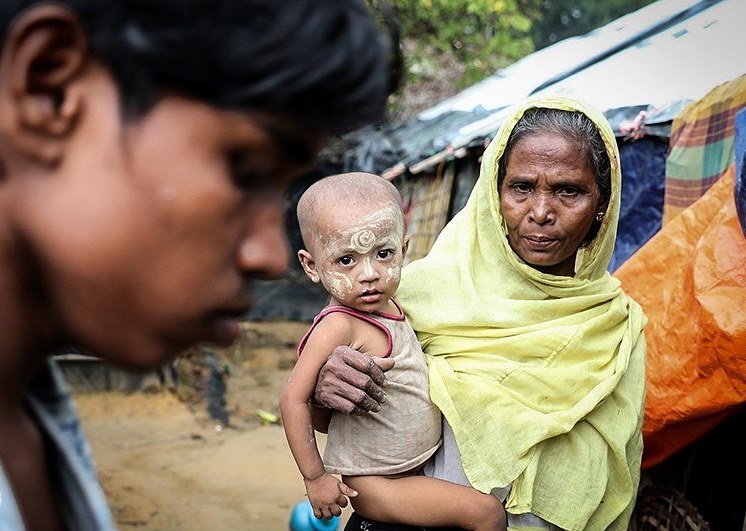New Delhi: The United Nations (UN) Special Rapporteur on contemporary forms of racism, racial discrimination, xenophobia and related intolerance in November 2020 published a report that addresses the discriminatory impact of emerging digital technologies on migrants, stateless persons, refugees and other non-citizens.
Published for the 75th session of the UN General Assembly, the report explains how borders are emerging as “digital borders”, which means technologies “are integrated into identification documents, facial recognition systems, ground sensors, aerial video surveillance drones, biometric databases, asylum decision-making processes and many other facets of border and immigration enforcement”.
Published to coincide with this report, the Institute on Statelessness and Inclusion, based in the UK, launched a brief focused on the Rohingyas in Bangladesh, India and Myanmar and their experiences of being “locked in and locked out”, of basic services as a result of fast-changing rules around digital and non-digital ID.
The force of these reports lie in highlighting how—far from being neutral systems—these “digital borders” are actually remodelling and institutionalising discrimination against marginalised groups, including the refugees, asylum-seekers and stateless populations. As the UN Special Rapporteur report observed:
“Governments and non-state actors are developing and deploying emerging digital technologies in ways that are uniquely experimental, dangerous, and discriminatory in the border and immigration enforcement context. By so doing, they are subjecting refugees, migrants, stateless persons and others to human rights violations, and extracting large quantities of data from them on exploitative terms that strip these groups of fundamental human agency and dignity.”
We have highlighted in our contributions to the two reports that this discrimination is happening right now in India—via exclusions from essential ID documents, like Aadhaar, and through separate efforts to collect biometric data from refugees for the purposes of surveillance and possible deportation.
Aadhaar Exclusions
Despite not being mandatory, Aadhaar has become an essential biometric-based ID document for access to basic services like banking, healthcare, education and jobs. Aadhaar does not denote citizenship and is available to non-citizen residents in the country.
For some time, refugees holding Long Term Visas (LTVs) and United Nations High Commissioner for Refugees (UNHCR) Refugee Cards were issued Aadhaar cards. However, from 2017, Rohingyas have not been issued LTVs permitting their stay in the country and, in October 2018, the ministry of home affairs changed the Aadhaar policy to exclude Refugee Cards as valid documentation to obtain the ID card.
These exclusions stand in contrast to the recent inclusions and protections the State has offered to non-Muslim migrant groups from Afghanistan, Pakistan and Bangladesh through the Citizenship (Amendment) Act, 2019.
Without Aadhaar and LTVs, Rohingya refugees have been refused access to education, health, banking and other essential services. Some Rohingyas have also been arrested or harassed by the police for apparently ‘fraudulently’ obtaining Aadhaar, when they actually received the cards before policy changes.
Even social and sports hobbies have been impacted by Aadhaar exclusions. A talented Rohingya youth in Hyderabad who hoped to play professional football one day, explained to us:
[In 2017] I got selected, after a trial, in a big local football club here in Hyderabad but since I don’t have Aadhaar I couldn’t join them. … When I replied that I only have a refugee card – they still tried by reaching out to the Indian Football Federation, which eventually rejected the request [to accept that documentation instead].
While Aadhaar is not without its faults—questions around data protection being one of the most urgent—it is unavoidable as an access document for basic services. And Rohingyas are being excluded from it.
Biometric Data Collection
On the flip side, Rohingyas are not free from their biometric data being collected. Despite the government already having Rohingya biometric data, a new drive began in 2017.
Rohingyas have noted that this drive has been more aggressive than past experiences, and they are fearful that the biometric data will be shared with the Myanmar government and used to forcibly deport them back to a country where they are facing genocide. At least a dozen Rohingya refugees have already been deported in recent years, and many more linger in jail facing the same prospect.
Detentions seem to be on the rise, with dozens of Rohingyas being jailed in recent months, including at least 10 in the last week. In a catch-22 scenario, Rohingyas have been detained for not having ‘valid’ documents while on their way to the UNHCR in Delhi to go through Refugee Status Determination (RSD) and obtain a refugee card.
However, UNHCR cannot undertake RSD in the border areas where refugees cross into the country, and UNHCR are often denied access to detained asylum seekers who were prevented from reaching their facilities. ‘Balancing’ security concerns and local politics have become smokescreens for intolerance and discrimination.
Going Forward
India needs to provide all refugees and asylum seekers with clear, non-discriminatory legal pathways for obtaining ‘valid’ documentation, in line with its international law obligations.
Where personal and biometric data collection is necessary for these processes, it must be sought using an approach that respects the dignity, agency and privacy concerns of refugees.
As the Institute on Statelessness and Inclusion’s report concludes: States, the “UN and other actors have a duty to protect the Rohingya and to stand against their refoulement, while searching for durable solutions based on basic human rights. Digital ID initiatives must complement, not hinder, such protection and rights-based approaches”.
Anubhav Dutt Tiwari is a PhD Candidate at the Faculty of Law, Monash University (Australia), and a Lecturer (on leave) at Jindal Global Law School, O.P. Jindal Global University (India).
Jessica Field, PhD, is a Lecturer in Humanitarian Studies at the Institute for Risk and Disaster Reduction, University College London (UK), and an Adjunct Associate Professor at the Jindal School of International Affairs, O.P. Jindal Global University (India). She recently edited a volume with Dr Srinivas Burra and UNHCR India titled, The Global Compact on Refugees: Indian Perspectives and Experiences(New Delhi: UNHCR India & AWG, 2020).

